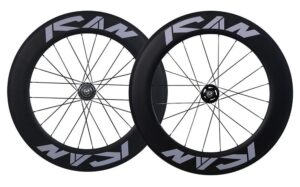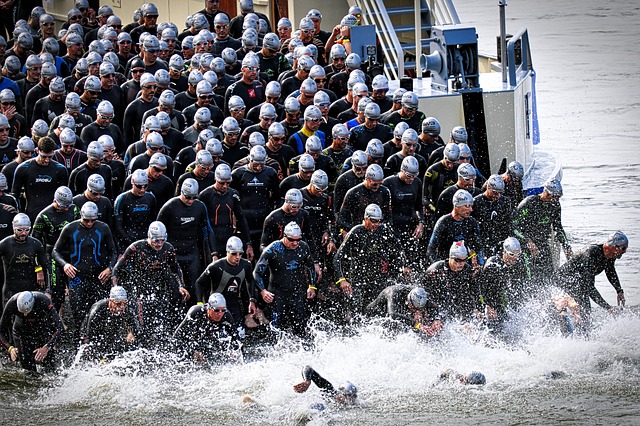Routines are one of the most important aspects of triathlon that you can develop to improve your conditioning, training, and race performances. Routines benefit all of your efforts in several ways:
- Routines ensure total preparation in your efforts.
- They enable you to be completely physically, technically, tactically, and mentally ready to perform your best.
- Routines ingrain effective skills and habits that make it easier to transition from training to racing.
- They train your mind and body to react the same way regardless of the importance or conditions of the race.
I don’t know a world-class athlete in any sport who doesn’t use routines in some part of their training efforts and race preparations. And, because triathlon is such a complex sport, routines are absolutely essential to your efforts, performance, and enjoyment in our sport.
 There are a lot of things in triathlon that you can’t control such as the terrain, road or trail surface, weather conditions, and your competitors. Ultimately, the only thing you can control is yourself. Routines can increase control over your performances by enabling you to directly prepare every area that impacts your triathlon. Those areas you can control include your equipment (is your gear in optimal condition?), your body (are you physically and technically warmed up?), and your mind (are you confident and focused?).
There are a lot of things in triathlon that you can’t control such as the terrain, road or trail surface, weather conditions, and your competitors. Ultimately, the only thing you can control is yourself. Routines can increase control over your performances by enabling you to directly prepare every area that impacts your triathlon. Those areas you can control include your equipment (is your gear in optimal condition?), your body (are you physically and technically warmed up?), and your mind (are you confident and focused?).
Routines also allow you to make your preparations more familiar and predictable and, as a result, more comfortable by knowing that you are systematically covering every area that will influence your performances. Routines can also help you expect the unexpected. In other words, as part of your routine, you can plan for every eventuality that could arise during a race. If you can reduce the things that can go wrong and be prepared for those things that do, you’ll be better able to stayed positive, focused, and relaxed before and during a race.
Routines vs. Rituals
Some sports psychologists and mental coaches use the term ritual in place of routine. I don’t like this term because it has connotations that go against what routines are trying to accomplish. Remember, the goal of routines is to totally prepare you to perform your best. Everything done in a routine serves a specific and practical function in that readiness process. For example, a physical and technical warm-up and a review of tactics for an upcoming race are all key for total preparation.
 In contrast, a ritual is associated with superstitions and is often made up of things that have no practical impact on performance, for instance, wearing lucky socks or needing to kiss your helmet before the race (yes, a client told me that one!). Routines can also be adjusted should the need arise, for example, if you arrive late to the race, you can shorten your routine and still get prepared. Rituals, though, are rigid and ceremonial. Triathletes can believe that rituals must be done or they will not perform well. In sum, you control routines, but rituals control you.
In contrast, a ritual is associated with superstitions and is often made up of things that have no practical impact on performance, for instance, wearing lucky socks or needing to kiss your helmet before the race (yes, a client told me that one!). Routines can also be adjusted should the need arise, for example, if you arrive late to the race, you can shorten your routine and still get prepared. Rituals, though, are rigid and ceremonial. Triathletes can believe that rituals must be done or they will not perform well. In sum, you control routines, but rituals control you.
Conditioning Routines
Routines are most often used by triathletes before races to ensure that they have every detail of their race under control and that they are prepared to perform their best. However, I believe that they are also essential in your discipline-specific training to ensure that you get the most out of your training time. Routines are also important in T1 and T2 to make sure that you get from the swim to the bike and then from the bike to run as quickly as possible. I’ll explore these three routines in Part II of my series. But there is a place in your tri-life in which you can begin to develop routines and that will help you build a solid foundation for your training and race routines. I’m talking about conditioning routines.
 Over the last few years, I have discovered an even better setting in which triathletes can begin to develop their mental “muscles:” the gym. Yes, using mental exercises and tools as a part of your physical conditioning program is a great way to begin to strengthen those mental muscles that will be of such benefit in the quality of your swim, bike, and run training and when you race.
Over the last few years, I have discovered an even better setting in which triathletes can begin to develop their mental “muscles:” the gym. Yes, using mental exercises and tools as a part of your physical conditioning program is a great way to begin to strengthen those mental muscles that will be of such benefit in the quality of your swim, bike, and run training and when you race.
Think of it this way. A set of intervals in swimming, biking, or running and, for example, a set of squats in the gym are physical performances that share many attributes. They all involve strength and technique. They hurt, especially at the end. And, most importantly, they require certain mental muscles and tools to maximize the gains you make from them.
A great thing about beginning your mental training in the gym is that it is a much less complex environment than in your triathlon training and, as a result, it is easier to exercise and strengthen the mental muscles. You have fewer variables, fewer things to think about, and, importantly, fewer distractions that can prevent you from focusing on and strengthening your mental muscles.
Conditioning, triathlon training, and race also have similar phases of execution:
- Preparation phase where you get yourself physically and mentally ready to perform your best.
- Performance phase where you are doing your best to perform at your highest level possible.
- Conclusion phase where you may be in pain and your body is telling your mind (often in a very loud voice!) to either ease up or stop because it hurts too much.
- Completion phase where you evaluate your performance and see what you can do to improve.
Everything mentally that you need to have and do for your triathlon training and in a race also applies to every set of a conditioning workout.
 There are several great benefits to using mental training in the gym. First, because you will be more mentally prepared for your workouts, you’ll give more effort, have more quality in that effort, and, as a result, you’ll make greater gains in your fitness. Second, you’ll be able to work on the mental tools before you get to your triathlon training, making that transition faster and smoother in incorporating them into your training and race preparations. Finally, once you are using mental tools in your physical conditioning, training, and race routines, you’ll ingrain them so deeply that when you get to your “A” race, all of those well-practiced mental habits will come out and they’ll enable you to perform your very best.
There are several great benefits to using mental training in the gym. First, because you will be more mentally prepared for your workouts, you’ll give more effort, have more quality in that effort, and, as a result, you’ll make greater gains in your fitness. Second, you’ll be able to work on the mental tools before you get to your triathlon training, making that transition faster and smoother in incorporating them into your training and race preparations. Finally, once you are using mental tools in your physical conditioning, training, and race routines, you’ll ingrain them so deeply that when you get to your “A” race, all of those well-practiced mental habits will come out and they’ll enable you to perform your very best.
Now that I’ve convinced you (hopefully) of the value of using mental training in the gym, you’re probably wondering how exactly you can begin to include it into your workout regimen. Here are five key mental areas you can incorporate into your conditioning routine that can then transfer over to your triathlon training and race efforts.
 Commitment. For you to get maximum gains from your conditioning, you must want it bad otherwise your body’s desire to avoid pain will overwhelm your desire to make fitness gains. Before each exercise, make a conscious commitment to put your best effort into it from start to finish: “You’re doing this!” (note: research has shown that talking to yourself in 2nd person is more effective than 1st person). This commitment is particularly important at the end of a set when you need to finish strong in the face of the inevitable pain you feel to get the most out of the exercise.
Commitment. For you to get maximum gains from your conditioning, you must want it bad otherwise your body’s desire to avoid pain will overwhelm your desire to make fitness gains. Before each exercise, make a conscious commitment to put your best effort into it from start to finish: “You’re doing this!” (note: research has shown that talking to yourself in 2nd person is more effective than 1st person). This commitment is particularly important at the end of a set when you need to finish strong in the face of the inevitable pain you feel to get the most out of the exercise.
Confidence. Say something positive that will give you a confident state of mind toward the exercise (e.g., “10 reps at 225 lbs., Y feel strong!”). This is especially important when doubts creep into your mind when you are, for example, doing a new exercise that you’re not that skilled at or you’re going to be attempting a weight you’ve never lifted before.
Mindset. Particularly in strength training, a doubting, tentative, or passive mindset just isn’t going to allow you to get the most out of your conditioning. In a way, you’re competing against the exercise; it wants to stop you from, for example, lifting the weight or completing the required number of reps. You have to attack the weight and impose your will on it. Otherwise, near the end of the set, your body will tell your mind to stop and your mind will listen. Adopting an aggressive mindset from the first rep to the last can make a big difference, particularly the last few reps when it gets hard: “You’re attacking this set!”
 Intensity. Different types of conditioning exercises require different levels of physical intensity to get the most out of them. If you don’t have the requisite intensity for a specific exercise, you won’t get the most benefit from it. For exercises that require strength and power, before every set, “rev your engine” by jumping up and down, taking some aggressive breaths, and using “psych-up” self-talk (“Let’s do it!). When you are doing low-intensity exercises, such as stretching or yoga, relax your muscles, breath deeply, and use “psych-down” self-talk (e.g., “calm and easy”).
Intensity. Different types of conditioning exercises require different levels of physical intensity to get the most out of them. If you don’t have the requisite intensity for a specific exercise, you won’t get the most benefit from it. For exercises that require strength and power, before every set, “rev your engine” by jumping up and down, taking some aggressive breaths, and using “psych-up” self-talk (“Let’s do it!). When you are doing low-intensity exercises, such as stretching or yoga, relax your muscles, breath deeply, and use “psych-down” self-talk (e.g., “calm and easy”).
Focus. Simply put, if you’re not totally focused on your best execution and effort in an exercise, you will not only not perform it well and gain its greatest benefits, but you may also hurt yourself. Before every set, stop talking to people, take a deep breath to direct your focus onto the exercise, take 5-10 seconds and imagine yourself doing the exercise well, and, finally, repeat a keyword that reminds you of an important thing you need to do to perform the exercise well (e.g., “straight back” or “attack”).
Because mental training is new and not a part of your overall training program, you’ll probably forget to use your routines sometimes. Don’t beat yourself up about it if you don’t remember every time. At first, you’ll need to be reminded to use your conditioning routine every set. I would recommend taping a sheet of paper on the wall or mirror of your workout space saying something like, “ROUTINE!). When you see it, you’ll be reminded to do it. And before you know it, your routines will become so ingrained that you use them automatically without needing reminders and your conditioning routine will enable you to become as strong as you possibly can be.
Do you want to take the next step in training your mind to perform your best in training and on race day? Here are five options for you:
- Read my Triathlon blog.
- Listen to my Train Your Mind for Athletic Success
- Read my latest mental training book: Train Your Mind for Athletic Success: Mental Preparation to Achieve Your Triathlon Goals.
- Take a look at myonline mental training courses.
- Schedule a 1:1 session with me.







